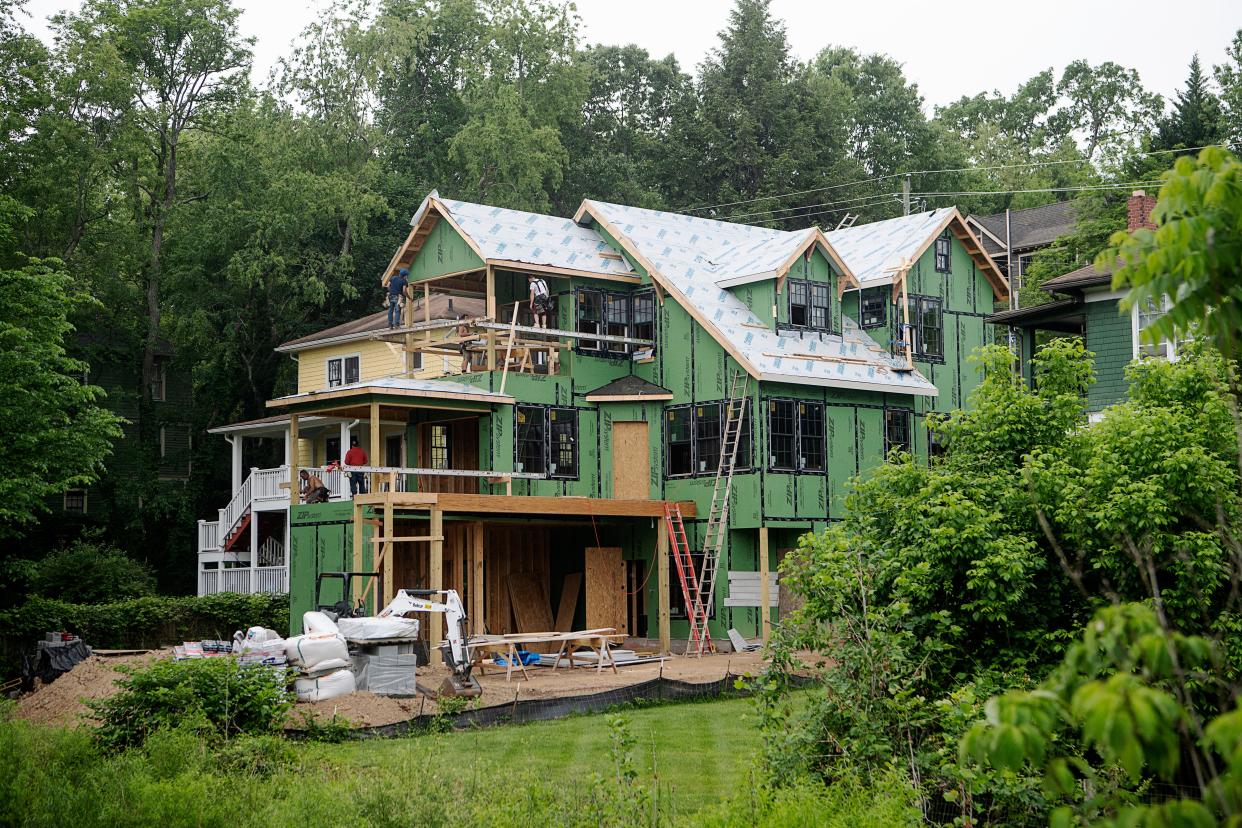As Buncombe County property reappraisal approaches: Here's what to know from tax office

ASHEVILLE – Be on the lookout in your mailboxes as Buncombe County begins its property reevaluation process, which as anyone paying attention to the local real estate market can imagine, might see property values the rise.
The county announced in a June 30 news release that it will be sending property record cards to property owners in the mail, which will detail information the county has on file for each property. Owners will need to certify that the information the Property Assessment Department has is correct and to notify the department detailing any inaccuracies.
Property owners will send that information back by tearing and mailing back the perforated part of the property record card. Residents are not obligated to send the card back affirming that the county’s information is correct, according to Buncombe County Tax Assessor Keith Miller, who spoke to the Citizen Times June 30.
The county’s new process is a departure from previous appraisal policy, which did not suggest property owners confirm whether county information is correct.
This marks the early stage of Buncombe County’s 2025 reappraisal process. North Carolina state law requires counties to reevaluate property values at least every eight years, but also affords counties discretion to reappraise more frequently. Buncombe County conducted its last reappraisal in 2021 and typically runs reappraisals every four years.
“When you’re in a real estate market that has the amount of yearly appreciation in value that we do, it’s best that the county do that more often than every eight years,” Miller said. “Reappraisal is about equalization.”
More: Undertaxed? $40M Asheville estate only taxed for $3M; county looks to change mansion taxes
He added that different areas of the county appreciate at different rates.
“Having everything equalized means everyone is paying their fair share,” he said.
North Carolina state law also requires that appraised property valuations be close to their true value. According to the county website, Buncombe County has 132,000 parcels of real property.
According to the County Budget dashboard, Buncombe County took in more than $240 million in property taxes in 2023 and is expecting to bring in more than $255 million in 2024.
Miller expects most property values to increase but said that it was too early to speculate on how much given that reappraisal is a year-and-a-half away.
More: Woodfin Robinhood development opponents ask higher court to review their appeal
The Buncombe County Commission recently approved a 1 cent per $100 property tax increase, bringing the tax rate for the 2024 fiscal year to 49.8 cents per $100 of assessed value.
The Citizen Times recently reported that Buncombe County is moving to adjust how the county’s wealthiest property owners are taxed. This followed reporting on how some of the most expensive houses were taxed far below sales values. That includes the $40 million Deerhaven Gardens in South Asheville, which was taxed as if it were valued at $3.3 million, less than a tenth of the value provided by their owners.

Appealing reappraisals
Buncombe County property owners can appeal their parcel’s appraised value. Here’s how:
Step 1: Informal appeal to the assessor. File an informal appeal at tax.buncombecounty.org within 30 days of receiving notice of the tax assessor’s initial judgement. The property owner will receive the results of the appeal in the mail. If the property owner likes the new assessment, they can certify that as their property’s new value. If not they can move to step 2.
Step 3: Formal appeal. File a formal appeal with the Assessor’s Office. An appraiser will contact the owner to discuss the value of the property. If the owner does not agree with the appraiser’s opinion, a formal appeal will be scheduled in front of the Board of Equalization and Review. This hearing requires the property owner’s attendance. A decision about the assessment will be made during this hearing. It will also be mailed to the property owner within 30 days. If the owner likes this new value, they can keep it, if not, they can move to step three.
Step 3: State appeal. If the property owner does not agree with the Board of Equalization and Review’s decision, they can file an appeal with the N.C. Property Tax Commission within 30 days of receiving notice from the Board. These appeals will be heard in Raleigh.
Step 4: State court appeal. If the property owner does not agree with the decision made by the state Property Tax Commission, they can appeal to the North Carolina Court of Appeals and Supreme Court.
More: 5-unit development proposed for 'sliver' of land beside Asheville Trader Joe's
Tentative reappraisal schedule
Here is the current schedule for reappraisal activity according to Buncombe County:
Through Dec. 2024: Door to door visits by county assessors.
Jan. 1, 2025: Effective date for 2025 reappraisal.
Jan. 30, 2025: Property owners receive notice of their property’s value in the mail.
Jan.-April 2025: Window to appeal the 2025 assessed value of owners’ properties. Property owners can file an initial appeal at tax.buncombecounty.org.
April 2025: Board of Equalization and Review adjourns and closes the appeal period for 2025.
June 30, 2025: Fiscal Year 2026 tax rate approved by Buncombe County Board of Commissioners.
Aug. 2025: Collector mails tax notice to property owners.
If residents have questions, they can call the Buncombe County Assessor’s Office 828-250-4940.
Mitchell Black covers Buncombe County and Health Care for the Citizen Times. Email him at mblack@citizentimes.com or follow him on Twitter @MitchABlack. Please help support local journalism with a subscription to the Citizen Times.
This article originally appeared on Asheville Citizen Times: Buncombe County tax reappraisal 2025 approaches: Here's what to know

